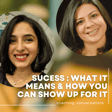Become a Creator today!Start creating today - Share your story with the world!
Start for free
00:00:00
00:00:01

Limiting Beliefs : Are your convictions coming in your way?
In this episode, we unravel the complexities of limiting beliefs—those subtle barriers stifling personal and professional growth. We discuss types of beliefs, from core to relational, and share real-life examples illustrating their impact. Join us as we explore the journey of recognizing and overcoming these barriers, offering insights and tools for reshaping your mindset. Change might not be easy, but armed with understanding and support, it's possible. Tune in and let's embark on this transformative journey together. Don't forget to subscribe, share, and follow us on "How We Think!"—where coaching conversations spark change.
Transcript
Introduction to the Podcast and Hosts
00:00:06
Speaker
Hey there, welcome to How We Think, a podcast that takes a deeper look at coaching conversations, the biases and beliefs that show up in such conversations, and ideas that make you sit up and take notice of your own patterns, behaviors and opportunities to change. I am Neha Indoria and I have the amazing Bhavna Vasti with me. Hey Bhavna, how are you doing?
00:00:29
Speaker
Hi Neha, I'm very well and very excited to be here today once again with you. Would you like to take us and all our listeners through on what we are going to talk about today?
What Are Limiting Beliefs?
00:00:43
Speaker
Yeah, absolutely Bhavna and it's always great to talk to you as well. Today, we are talking about limiting beliefs. You know, those deeply ingrained thoughts, perceptions or convictions that constrain individuals, often holding them back from achieving their full potential or pursuing certain opportunities. These beliefs are usually self-imposed and can be psychological barriers that limit personal or professional growth.
00:01:10
Speaker
You know, and I feel like a good way to start thinking about this would be to begin at belief. Subhana, what is your belief around belief? Yeah, interesting way to start the conversation, but you're right. I think we do need to talk about
00:01:29
Speaker
what are beliefs before we can actually get into limiting beliefs or creating empowering beliefs. So beliefs, not just what are beliefs, but where do they come from? Like what is the beginning of it all? So beliefs are sometimes given to us by our parents, by our society. These are beliefs that are almost like norms that we live our lives by. And other times,
00:02:00
Speaker
There are these beliefs that we kind of arrive at, you know, based on our experiences, based on our learnings, based on our failures.
The Impact of Beliefs on Life and Coaching
00:02:08
Speaker
Sometimes we create our own beliefs and these are, these could be called compensatory or these could be called adopted beliefs, but nevertheless,
00:02:18
Speaker
It's the fundamental building blocks on what we base our thinking and actions on. I mean, to start off with, that's a belief. What do you think?
00:02:33
Speaker
It is so intertwined with who you are that a lot of times beliefs, it is difficult to define a belief and you're right. It can come from so many places, right? It can come from your core. It is something, it is who you are. It is no longer separate from you. It can be based on
00:02:50
Speaker
your perceived performance or your perception of your ability, it can be given to you from society, culture or your spiritual, political or other ideologies. And sometimes these thoughts are great fuel for your potential, like I can do this and I do well when challenged. And at other times,
00:03:10
Speaker
not so much stuff like this always happens to me. I mean, that's also that's also a belief or life is fair or my manager doesn't like me or I don't like my manager. You know, wherever they come from, they definitely show up in our conversations with ourselves and with others.
00:03:29
Speaker
Yeah. And, you know, interestingly, I just want to draw a little bit of a background on why we thought I mean, the last podcast that we did was taking in possibilities. And even while we were talking, both of us were talking and, you know, about thinking and possibilities. The next thing that we automatically landed was what's going to come in the way. And one of the things was our belief system, our beliefs about us.
00:03:56
Speaker
And that's why we landed today talking about this. Another reason why this is important to talk about is because as coaches, there are many times that we, at least I see people come up with problems that are important, things that may not be working in their lives. But in the larger scheme of things, those are just outcomes or transactional things that are defining
00:04:26
Speaker
their outcomes, but they're coming from a space of belief. And that's why it becomes more critical to talk about belief. And this is something that I do a lot in my practice. I do work around belief and values of a person in order to understand what's really happening in their lives. What are the outcomes they're making for themselves?
00:04:49
Speaker
Now, from our perspective as coaches and what we have seen through our coaching conversations, the ones that really show up more often than not,
00:04:58
Speaker
as limited beliefs are from the category core beliefs, the relational beliefs, conditional beliefs, and implicit and explicit beliefs.
Categories and Examples of Beliefs
00:05:11
Speaker
I know these are many words that I've just laid out there. And I think let's just define a little bit, talk a little bit about each of these four categories that tends to show up in our coaching conversations.
00:05:28
Speaker
I keep going back to this thought that it is difficult for you to even recognize that. And I think that is where the talking about these subcategories will help. And to just simplify the idea that it is rooted inside you as a belief. If I could just share a little anecdote. I was talking to this client and she is at a point in her life where she really wants to make a change in her career.
00:05:55
Speaker
She is held back by this one thought that she can't get the rules that she wants because she doesn't come from a great college.
00:06:03
Speaker
And that belief gets fortified further because when she goes up on LinkedIn and she's looking at other posts and she's thinking of these are the kind of roles that she wants, more often than not, those roles are filled by people who come from the right kind of colleges. So she's like, oh, excellent, is that, sorry, probably should not mention a college, but you get that point.
00:06:31
Speaker
And then it gets added on by another belief. So the idea that, okay, so you might not have a brand, but then you have the opportunity to create a brand. So why wouldn't you want to do that? That idea gets shut down by another belief that if you are talking yourself up on social media, then that's not done.
00:06:53
Speaker
Somebody else can praise you, but how can you talk about it? So where we left the conversation the other day was, how do you quantify or how do you showcase effort? That was the question that kind of made her realize that it's more. Yeah, yeah.
00:07:16
Speaker
And, you know, as I was listening to her, the visual picture that came in my head was that of an embankment that you see next to a shoreline. You know, a wave of will rises and it says that I want to do more or something different. And then this is what I want to do. It moves closer to the shoreline only to crash into the wall that pushes it back with saying, you're not good enough. And that to me defines what limiting beliefs can do to you.
Exploring Core and Relational Beliefs
00:07:43
Speaker
Now, if we go back to the four different ones that you spoke about, I think you started with core. Yeah. Yeah. Okay. So, core beliefs for most, I mean, for all of us are fundamental beliefs deeply ingrained within our identity and self-concept. It's how I see me and how I want the world to see me. And these beliefs often shape our worldview.
00:08:13
Speaker
our values and our overall perspective on life.
00:08:19
Speaker
So imagine that there is a person and I'm going to take a live example of a client where this client had a difficult childhood because he lost both his parents. I mean, the story is that he anyways, his father was not around and he lost his mum when he was four months old.
00:08:44
Speaker
So him and his siblings were raised by the aunts and uncles. There were two aunts and one uncle that his mum had and each one of them took one of the kids. So these are three siblings and my client is sitting and telling me the story.
00:09:04
Speaker
Now he's had this, the start of his life is this event. And this event has largely defined how he sees family, how he sees parents, how he sees what he shouldn't be asking because that's not his real parents.
00:09:25
Speaker
Now, imagine this, the societal contribution to the story is constantly one of the other relative coming and saying, yeah, but this is not your real mum. I mean, this is your aunt, your aunt and uncle. So when I was working within and exploring who he is and what makes him, him, the one thing that he kept saying was,
00:09:50
Speaker
But I have, I have nothing. I have no permanency in my life. My parents are also not mine. I mean, parents are the ones that are supposed to hold you, like provide for you, you know, define how world is going to be teach you. But I don't, I didn't have those parents. I had my aunt and uncle. And this is how his lead is like now this
00:10:15
Speaker
this understanding of who he is and what his environment is, even having contributions from outside, has defined how he's shown up in his life. Now, as an adult, when he has children, he is conflicted. He has this internal dissonance where he knows parenting to be a certain way.
00:10:40
Speaker
because of what he's received. But he also has children now who expect more from him, just because he thought these are not my real parents. So I cannot ask for what I want. He's being asked all the time. And there is an internal dissonance that's happening within him. And that's what we were talking. So that right there is an example of a fundamental core belief at play, not serving you.
00:11:09
Speaker
Yeah. Wow. I mean, and also I think you really made me feel for your client right now. I wouldn't, you know, it is difficult to imagine what that core belief would look like. But then in your story, you also kind of highlighted what a conditional belief looks like, right? The core constantly gets reinforced by what our overall environment is and what we tell ourselves as a result of it.
00:11:39
Speaker
You know, you, you mentioned the, the example of, I have nothing. Now, if I have nothing is what, is what I have as a belief, my conditional belief will be, I will be happy when I have everything, but not necessarily that happiness will come through. So yeah. So I get how, um, conditional belief is so, uh, intertwined with the core one.
00:12:04
Speaker
Mm hmm. Correct. They're all it's amazing how they kind of all slide and slip into each other and then come, come out the other end, looking a little bit differently. So if we talk about relational beliefs, and these are beliefs about relationships, and what do what are relationships really based on? They're based on trust. They based on communication, intimacy, commitment,
00:12:33
Speaker
So these relational beliefs influence how we form and maintain relationships. So imagine that you've grown up and had a couple of your core relations or relationships not deliver. For example, if I wanted my sibling to have my back,
00:13:00
Speaker
You know, that's the one thing that I want my sibling or not rat on me. As simple as that sometimes, right? Not stick on me. And that's not happened. I actually look at a core relationship as some something that is lacking trust or commitment.
00:13:16
Speaker
And now because I have that view over about a core relationship, it will show up in my other relationships. I will have that bias where I'm starting to think, yeah, but that's how people are.
00:13:31
Speaker
You know, not necessarily people will have your back. My own sibling did not have my back. So that right there is how we will show up in our relationships, lacking trust, lacking commitment and feeling that that's how the world works.
00:13:48
Speaker
And that feeling is what you could possibly call an implicit belief. It is so unconscious and so unspoken, but it creates your convictions. You would probably not even say that, oh, my sibling didn't trust me. So that's why I don't trust the world. But you are always living with the fact that you can't trust anybody.
Recognizing and Addressing Limiting Beliefs
00:14:07
Speaker
It's you are, you are alone, like, you know, or you are all you have in this world. You can see the wall getting built up big by brick by brick. You know, the beliefs are, are
00:14:17
Speaker
are influencing each other, they're influencing your behavior, sometimes you get validation for the behavior that you do and therefore you start internalizing them and that's where your implicit and explicit beliefs come. Sometimes you do action without thinking and sometimes your view would be fairly open and expressive about what you believe is to be a certain way.
00:14:42
Speaker
And that's how, that's all the different ways that it can show up. It sounds, we are painting a very bleak picture, Bhavna, I must say. It is sounding like you have created a little whirlpool for yourself and the only way is down. But no, no, dear listeners, this is not the point of this podcast. Let's turn this around. Where do we start, Bhavna?
00:15:11
Speaker
From what I'm hearing, you use the word, we are painting a big picture. But let's just say we are putting the foundation quotes, the background for the painting that's going to emerge. And that background is very important must like exploring how our beliefs shape our lives, how our beliefs contribute to our narrative and understanding of our world.
00:15:39
Speaker
is as important as looking at, how do I recognize whether this belief is working for me? And fundamentally, even before you recognize there is, I mean, and this is something that I'm seeing in people when I'm working in a coach capacity with my clients. More often than not, the starting point of
00:16:04
Speaker
exploring or recognizing what's a belief and whether it is working or not is the internal dissonance. There is an internal conflict in what I know and what is and what needs to be. There is a mismatch between the three. So recognition is first coming from an internal turmoil, internal unrest,
00:16:28
Speaker
disbalance say you can use whatever word but that's what it's a feeling first before it becomes cognitive before it becomes let's look at it in a logical rational manner have a conversation about it before that it's a quiet feeling that comes knocking
00:16:47
Speaker
And if you're sitting with an uneasy feeling like, I feel like this is not right, or I know what needs to be done, but I'm not aligned to it, that right there is something that you need to pay attention to, lean into. It's like they talk about opportunities, right? They knock very softly. You have to be listening. You have to be listening to when they're knocking to actually take them on or accept or whatever.
00:17:17
Speaker
So the first marker is the internal cognitive dissonance. It's a psychological term I get and describes the discomfort or tension experienced within oneself because of contradictory beliefs or attitudes or behaviors that may emerge from them.
00:17:41
Speaker
It's literally like an inconsistency between two cognitions, like two beliefs or two actions that may not be aligning. And that right there is like the first start of the recognition.
00:17:58
Speaker
So what you're saying is that some of the key elements that you might experience in the process of recognizing it is inconsistency, discomfort, or a need for resolution. And a good example perhaps to explain this would be that, let's say you're saying you believe that you are trying to be the best parent to your child. And yet, you know, you will overreact, you will yell or you will overdiscipline your child at the smallest little thing.
00:18:27
Speaker
So that right there could be a sign of a cognitive dissonance. And the cognitive dissonance is not the fact that you yell. The cognitive dissonance is the fact that you feel guilt right afterwards. I think that is what should kind of...
00:18:45
Speaker
should point you in the direction. Yeah. And at that point, probably a good step to do is to start labeling it that okay, this, this guilt is coming because it is not sitting true with my belief of being a better parent, you know, that, that I'm generally working with. Yeah, yeah, totally. More often than not, even when we are labeling it, or we are recognizing it,
00:19:14
Speaker
Addressing limiting belief is a process of self-reflection. It's a process of challenging assumptions.
00:19:25
Speaker
I want to highlight that word assumption. Just a quick example, I was talking to a client and I asked him, what would you want to bring to the conversation today? And his whole demeanor was extremely serious and he looked tensed.
00:19:45
Speaker
And and what I was picking up from that was that this is going to be like a really tough conversation for him because he's he's so stressed out already, even before he's spoken about it. And he comes and tells me that, you know, I lack motivation to start things like I'll have great ideas, but I won't take the first step. I've never taken the first step.
00:20:08
Speaker
And he holds a great position in a great organization. And he's really valued. He's an individual contributor, which which also makes him a subject matter expert, one who is only like about four or five people in the country. That's who he is. Right. And now he's coming and sitting in front of me and saying, I never take the first step. I have great plan, but I don't follow through. And
00:20:33
Speaker
I recognize that the discomfort is also from this judgment that he's passing, but for him, that's not judgment, that's a reality. And then it is meaning that somewhere it's in that belief area. And I actually, because I'm supposed to be non-judgmental as a coach, I'm picking it up as an assumption. So I said, okay, so tell me, you say I've never taken the first step.
00:20:57
Speaker
So what if you did take the first step at the very goal? You have an idea, you take the first step. And he says, I would be doing 100. You know, if I would be doing 100. So I said, okay, that's good. You've quantified it. How much do you think you're doing now? He says, ah, about 70. And
00:21:19
Speaker
I kept holding my presence and he leaned back into his chair and had a big smile and he says, it sounds silly, right? I kept saying, I never take that fall and yet I'm at 70. So it means I just have to correct the 30 that is a lack here.
00:21:40
Speaker
And so this assumption, which was part of his narrative, I never take the call. We say it so simply, but the impact it has that it is a perception that we've created about ourselves and how limiting it was for him because he judged himself in that manner.
00:22:03
Speaker
And that's where the transition started for him.
Obstacles to Changing Beliefs
00:22:06
Speaker
And what he thought was like a life-defining problem got sorted in the next 25 minutes. And he was laughing. He was like, oh, I just have to do this then. And like, yeah, you're already like 70% of the way there. Yeah. So yeah, what do you think about that example?
00:22:28
Speaker
I think perspective, I mean, everything changes when you start to get things differently. And it is almost always a question of perspective. And when you were telling me the story, and, you know, that was the thought that was going on in my mind that, you know, you're a senior leader, you are in this position, and you're an individual contribution subject matter expert, of course, you have done some things right.
00:22:49
Speaker
But the idea is not that we understand it as coaches or anybody else in your life understands that the idea is always that you understand it, which is where these funny little beliefs that we have about ourselves kind of come in the way. And speaking of
00:23:07
Speaker
things coming in the way, you know, it is not, it's not a straight road. Most of the time, even if you understand that I have done 70% and only 30 is left, various things can, can come in the way, you know, the biggest one I feel I have seen is, is strong emotional investment and personal significance that we attach to some things. You know, I spend so much time doing this, or I have
00:23:35
Speaker
I have spent so much effort doing this how can I walk away if there is something about walking away or you know
00:23:44
Speaker
This is who I am. So you believe it so strongly or you have such a great connection to it. I'm going back to some words that you said to me once. It's almost been like that that part of that belief has been your friend for so long. It is difficult to understand. And then there's also confirmation bias. You only look at the information that supports your belief.
00:24:11
Speaker
Another big one that happens is the fear of uncertainty. If you give up what you know, then what do you know? There is nothing left.
00:24:20
Speaker
And I think our most important one is around our identity and self-image, which I was just saying, this is who I am. So how can I be anything else? But you know, sayings are sayings for a reason. And the one that comes to mind is, don't throw away the baby with the bathwater. Like, yes, you've gone through a lot. It seems like you are quitting and not really changing directions, but
00:24:46
Speaker
What you're doing is accepting that this doesn't work any longer and that's okay. It's just a change. Yeah. So many thoughts coming to my mind when you just spoke about that emotional attachment or, you know, the investment that we've made. I've done this for so long. This is what defines me.
00:25:11
Speaker
So the deeper connect that we make for most of our things is we define ourselves through our actions. Our actions come from our beliefs. And sometimes we have beliefs about beliefs. So that right there is also another fun space where, you know, we need to be a certain way is a belief. Now, that certain way has to follow this norm is a belief about a belief.
00:25:40
Speaker
In the first place, the first belief is not working that we need to be like, you know, it's like that some people say I need to, I was taught that I always have to be sharing and caring as a child. Now as an adult, I'm like sharing and caring like nobody's business. But I don't get the same sharing and caring reciprocated towards me. Now I'm sitting with this, that belief is not working for me, that I cannot be sharing and getting everywhere in all facets of my life.
00:26:10
Speaker
Yeah. And now I have a belief that people are not good. Nobody who's kind of being your cheerleader will be your real friend or something like that. So it's a belief about a belief. And the next thing that I want to talk about is what can support.
00:26:39
Speaker
one in
Strategies for Evolving Belief Systems
00:26:40
Speaker
this journey or overcoming obstacles to this belief change that seems to be what we've been talking about in the past sometime now. So I want to talk about one to start from a space of having an open mind, open mind towards new information or perspectives or experiences.
00:27:07
Speaker
also bringing in logical, rational, critical thinking. So basically evaluating beliefs critically, questioning assumptions and seeking evidence towards those assumptions. We sometimes sit with these internal narratives that at some point
00:27:29
Speaker
came from a real place, but post that, they don't connect. And yet we are just clinging to them. So questioning assumptions, seeking evidence, exposing ourselves to diverse views, engaging with people who are not like us. In today's day and age, diversity is not about gender. It's about diversity of thought.
00:27:59
Speaker
and having openness to new ideas, putting yourself in situations with diverse people, that right there is an environment where you are learning, learning to reinvent your outcomes based on your beliefs and your thinking patterns and gradually
00:28:24
Speaker
arriving at a place so if you think okay today this is my belief and now I think it's not working for me and let me now create something new or ditch this one and tomorrow I'm going to be this person I don't think that's also how change happens it is gradual and it is slow and it is only then rooted and consistent so
00:28:50
Speaker
Yeah. So these are what are coming up in my mind. Anything you want to add here? A lot of us almost have this movie-like view of how things will change. Suddenly, Simran will run to the train and suddenly the father will let her hand go and everything will be different and everybody's views and perceptions will be different.
00:29:18
Speaker
the only thing I think I would like to add is that habits bad or good are habits because you have done them for a long time and I think that's the key that you have done them for a long time so you have to keep reminding yourself that it is a marathon it's not a race it will not happen suddenly but maybe one day it will and even if it comes to 70%
00:29:40
Speaker
Who's judging? Who's saying 100% is the 100% in somebody else's book? It might be 50%. It doesn't matter. Your book is the one that matters. Yeah. So that gentleness towards yourself. There is this concept I had read about let come and let go. So it's not just about letting go. It's about letting come also.
00:30:05
Speaker
And I usually say, let come and let go. Only when we have something that is going to be there to fill the gap that we are consciously creating is when we will allow. And that's just how the human mind works.
00:30:23
Speaker
We hate empty drawers. If you look at our mind as a chest of drawers, we hate empty drawers. And the moment one drawer is empty, or we have to empty it out, the hesitation and the anxiousness is about, oh, now it's going to be empty. So I say, let come. Let come the awareness. Let come the new thinking, the new perspectives, the willingness to consider alternative viewpoints.
00:30:50
Speaker
to facilitate a belief system evolution and once that happens the letting go would be easy. You would have supported or created that support system for your internal landscape and everything's going to be okay.
Conclusion and Listener Engagement
00:31:12
Speaker
Make space for empty drawers.
00:31:17
Speaker
Yes. Or rather empty your drawer and make space. Empty the drawer. I think that's the line where we might want to pause today. How about you? Is this a good place for us to pause? I think it's a good place to pause.
00:31:34
Speaker
Thank you for being here. It was a great conversation as always. And thank you folks for listening. Do write to us about what you think of this conversation and any other topics that you would like us to explore in the next episode. And if this episode resonated with you in any way, we would appreciate it if you could take 30 seconds to follow us on our adventures, share it with someone who may need it and definitely hit subscribe to stay up to date. Thank you and goodbye.






